#Sardar Soleimani
Text
🚩 « L'Iran a offert ses hommes les plus chers, le martyr Sardar Haj Qassem Soleimani, sur le chemin de la résistance. C'est l'Iran."
Sayyed Hasan Nasr'Allah
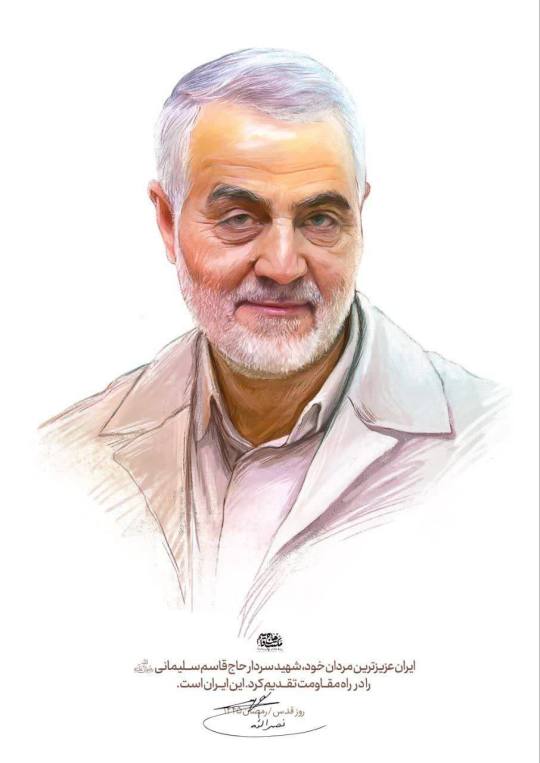
2 notes
·
View notes
Text
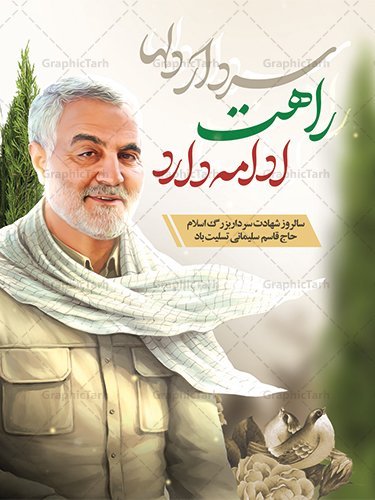
Sardar Soleimani sacrificed his entire youth and life for the security of the people of Iran and the region. He destroyed ISIS, which was created by America, that’s why American 🇺🇸 terrorists assassinated him. #Hero #GeneralSoleimani #جانفدا #مردمیدان #سرداردلها #شهید_القدس
0 notes
Text
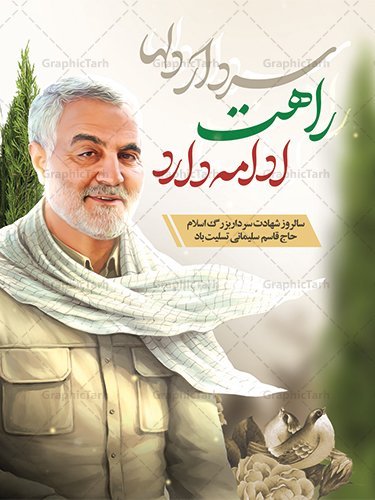
Sardar Soleimani sacrificed his entire youth and life for the security of the people of Iran and the region. He destroyed ISIS, which was created by America, that’s why American 🇺🇸 terrorists assassinated him. #Hero #GeneralSoleimani #جانفدا #مردمیدان #سرداردلها #شهید_القدس
0 notes
Text
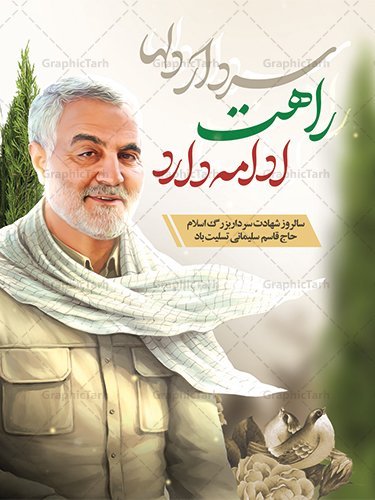
Sardar Soleimani sacrificed his entire youth and life for the security of the people of Iran and the region. He destroyed ISIS, which was created by America, that’s why American 🇺🇸 terrorists assassinated him. #Hero #GeneralSoleimani #جانفدا #مردمیدان #سرداردلها #شهید_القدس
0 notes
Text
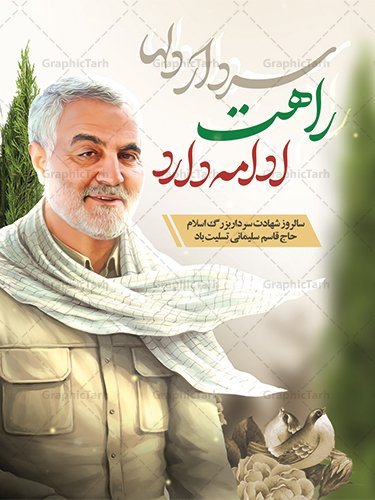
Sardar Soleimani sacrificed his entire youth and life for the security of the people of Iran and the region. He destroyed ISIS, which was created by America, that’s why American 🇺🇸 terrorists assassinated him. #Hero #GeneralSoleimani #جانفدا #مردمیدان #سرداردلها #شهید_القدس
⚠️ The united states is a terrorist state.
0 notes
Text
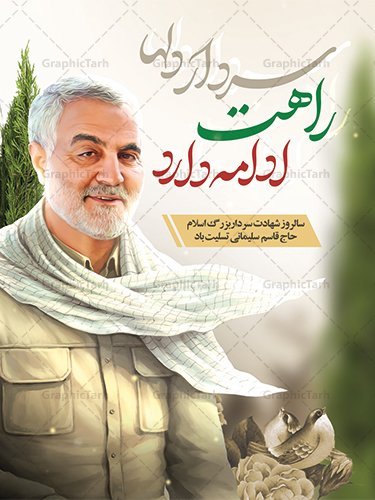
Sardar Soleimani sacrificed his entire youth and life for the security of the people of Iran and the region. He destroyed ISIS, which was created by America, that’s why American 🇺🇸 terrorists assassinated him. #Hero #GeneralSoleimani #جانفدا #مردمیدان #سرداردلها #شهید_القدس
0 notes
Text
Sardar Soleimani sacrificed his entire youth and life for the security of the people of Iran and the region. He destroyed ISIS, which was created by America, that’s why American 🇺🇸 terrorists assassinated him. #Hero #GeneralSoleimani #جانفدا #مردمیدان #سرداردلها #شهید_القدس
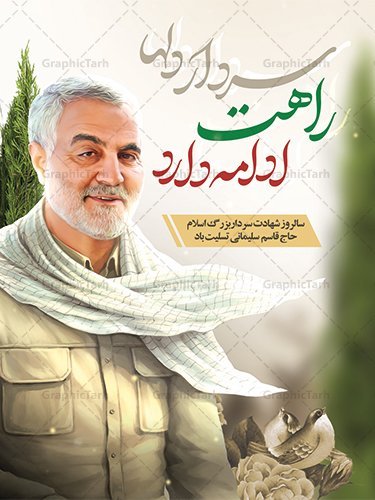
Sardar Soleimani sacrificed his entire youth and life for the security of the people of Iran and the region. He destroyed ISIS, which was created by America, that’s why American 🇺🇸 terrorists assassinated him. #Hero #GeneralSoleimani #جانفدا #مردمیدان #سرداردلها #شهید_القدس
0 notes
Text
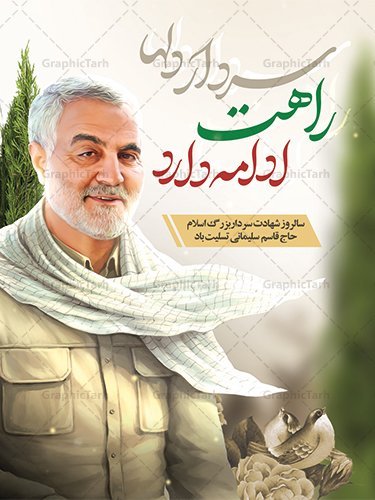
Sardar Soleimani sacrificed his entire youth and life for the security of the people of Iran and the region. He destroyed ISIS, which was created by America, that’s why American terrorists assassinated him. #Hero #GeneralSoleimani #جانفدا #مردمیدان #سرداردلها #شهید_القدس ⚠️ The united states is a terrorist state.
1 note
·
View note
Text
Qasem Soleimani Biography and Profile
New Post has been published on https://www.politicoscope.com/qasem-soleimani-biography-and-profile/
Qasem Soleimani Biography and Profile
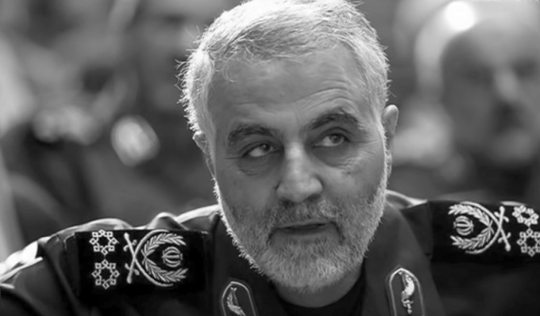
Qasem Soleimani, born 11 March 1957. Physically, he is unprepossessing. His face gently frosted with a close-cropped white beard, his dreamy eyes seeming to shine with the recollection of a fond memory, he bears more than a passing resemblance to mid-career Sean Connery, circa Indiana Jones and the Last Crusade. He is short in stature—a fact he has been known to highlight, dubbing himself “the smallest soldier.”
For Iranians whose icons since the Islamic Revolution have been stern-faced clergy, Maj. Gen. Qassem Soleimani widely represented a figure of national resilience in the face of four decades of U.S. pressure. For the U.S. and Israel, he was a shadowy figure in command of Iran’s proxy forces, responsible for fighters in Syria backing President Bashar Assad and for the deaths of American troops in Iraq. Solemani survived the horror of Iran’s long war in the 1980s with Iraq to take control of the Revolutionary Guard’s elite Quds Force, responsible for the Islamic Republic’s foreign campaigns.
In secret U.S. diplomatic cables released by WikiLeaks, U.S. officials openly discussed Iraqi efforts to reach out to Soleimani to stop rocket attacks on the highly secured Green Zone in Baghdad in 2009. Another cable in 2007 outlines then-Iraqi President Jalal Talabani offering a U.S. official a message from Soleimani acknowledging having “hundreds” of agents in the country while pledging, “I swear on the grave of (the late Ayatollah Ruhollah) Khomeini I haven’t authorized a bullet against the U.S.”
U.S. officials at the time dismissed Soleimani’s claim as they saw Iran as both an arsonist and a fireman in Iraq, controlling some Shiite militias while simultaneously stirring dissent and launching attacks. U.S. forces would blame the Quds Force for an attack in Karbala that killed five American troops, as well as for training and supplying the bomb makers whose improvised explosive devices made IED — improvised explosive device — a dreaded acronym among soldiers. In a 2010 speech, U.S. Gen. David Petreaus recounted a message from Soleimani he said explained the scope of Iranian’s powers.
“He said, ‘Gen. Petreaus, you should know that I, Qassem Soleimani, control the policy for Iran with respect to Iraq, Lebanon, Gaza and Afghanistan,’” Petraeus said.
The U.S. and the United Nations put Soleimani on sanctions lists in 2007, though his travels continued. In 2011, U.S. officials also named him as a defendant in an outlandish Quds Force plot to allegedly hire a purported Mexican drug cartel assassin to kill a Saudi diplomat. But his greatest notoriety would arise from the Syrian civil war and the rapid expansion of the Islamic State group. Iran, a major backer of Assad, sent Soleimani into Syria several times to lead attacks against IS and others opposing Assad’s rule. While a U.S.-led coalition focused on airstrikes, several ground victories for Iraqi forces came with photographs emerging of Soleimani leading, never wearing a flak jacket.
“Soleimani has taught us that death is the beginning of life, not the end of life,” one Iraqi militia commander said.
Who is Major General Qassem Soleimani?
Qasem Soleimani, born 11 March 1957, was an Iranian Major General in the Islamic Revolutionary Guard Corps and since 1998 commander of its Quds Force, a division primarily responsible for extraterritorial military and clandestine operations. Soleimani was said in his homeland to have grown up near the mountainous and the historic Iranian town of Rabor, famous for its forests, its apricot, walnut and peach harvests and its brave soldiers. The U.S. State Department has said he was born in the Iranian religious capital of Qom.
By the time he was 13, Soleimani began working in construction, later as an employee of the Kerman Water Organization. Iran’s 1979 Islamic Revolution swept the shah from power and Soleimani joined the Revolutionary Guard in its wake. He deployed to Iran’s northwest with forces that put down Kurdish unrest following the revolution.
Relatively unknown in Iran until the 2003 U.S. invasion of Iraq, Soleimani’s popularity and mystique grew out American officials calling for his killing. Soon after, Iraq invaded Iran and began the two countries long, bloody eight-year war. The fighting killed more than 1 million people and saw Iran send waves of lightly armed troops into minefields and the fire of Iraqi forces, including teenage soldiers. Solemani’s unit and others came under attack by Iraqi chemical weapons as well. After the Iraq-Iran war, Soleimani largely disappeared from public view for several years, something analysts attribute to his wartime disagreements with Hashemi Rafsanjani, who would serve as Iran’s president from 1989 to 1997. But after Rafsanjani, Soleimani became head of the Quds force. He also grew so close to Khamenei that the Supreme Leader officiated the wedding of the general’s daughter.
As chief of the Quds — or Jerusalem — Force, Solemani oversaw the Guard’s foreign operations and soon would come to the attention of Americans following the 2003 invasion of Iraq and the overthrow of Saddam Hussein.
By the time it came a decade and a half later, Soleimani had become Iran’s most recognizable battlefield commander, ignoring calls to enter politics but becoming as powerful, if not more, than its civilian leadership.
“The warfront is mankind’s lost paradise,” Soleimani recounted in a 2009 interview. “One type of paradise that is portrayed for mankind is streams, beautiful nymphs and greeneries. But there is another kind of paradise. The warfront was the lost paradise of the human beings, indeed.”
Despite its ongoing economic woes, today’s Iran has fashioned itself into one of the premier military and diplomatic powers in the Middle East—and Saudi Arabia’s principal rival for hegemony over the entire region. It has achieved this with a mix of policies—among them, deft diplomatic maneuvering; a tactical alliance with Vladimir Putin’s Russia; and the provision of arms, advice, and cash to Shi`a militias across a variety of countries. In the latter case, Iran has pioneered a seemingly unique strategy that combines insurgent and state power in a potent admixture—a strategy that is evident today in Lebanon, Syria, Iraq, and Yemen.
One man is recognized as the principal architect of each of these policies: Major General Qassem Soleimani. He was considered one of the most infamous military operators in the Middle East by the United States and its allies. As leader of the Islamic Revolutionary Guard Corps’ elite Quds Force, he bore responsibility for Iran’s clandestine operations abroad, quietly extending the military reach of Iran deep into foreign conflicts such as those in Syria and Iraq. Although revered in his home country and feared on battlefields across the Middle East, Soleimani remains virtually unknown in the West.
Yet to say that today’s Iran cannot be fully understood without first understanding Qassem Soleimani would be a considerable understatement. More than anyone else, Soleimani has been responsible for the creation of an arc of influence—which Iran terms its “Axis of Resistance”—extending from the Gulf of Oman through Iraq, Syria, and Lebanon to the eastern shores of the Mediterranean Sea. Today, with Assad’s impending victory in his country’s calamitous civil war, this Iranian alliance has become stable enough that Qassem Soleimani, should he be so minded, could drive his car from Tehran to Lebanon’s border with Israel without being stopped. And, as the Mossad chief Yossi Cohen has pointed out, the same route would be open to truckloads of rockets bound for Iran’s main regional proxy, Hezbollah.
To Middle Eastern Shi’ites, he is James Bond, Erwin Rommel and Lady Gaga rolled into one. To the West, he is the commander of the Quds Force of Iran’s Revolutionary Guards—responsible for exporting Iran’s Islamic revolution, supporting terrorists, subverting pro-Western governments and waging Iran’s foreign wars. A veteran of the Iran-Iraq war, Hajj Qasem, as he is known, took command of the Quds Force in the late 1990s. The Force is paymaster of Hizballah, Hamas and other terrorists plaguing Israel.
Soleimani’s Quds unit, tasked with conducting operations outside Iran’s borders, provided strong support for Syrian President Bashar al-Assad when it appeared to be close to defeat in the 2011 civil war. They also helped armed groups defeat the Islamic State of Iraq and the Levant (ISIL) group. Soleimani became head of the IRGC in 1998 and for years did not draw attention to himself as he strengthened Iran’s ties with Hezbollah in Lebanon, with Assad in Syria and with Shiite militant groups in Iraq.
In recent years, he has come under the spotlight when appearing alongside Iran’s top Ayatollah leader Ali Khamenei and other Shiite leaders. Under Soleimani’s leadership, the IRGC expanded its capabilities significantly, making a significant impact in the intelligence, financial and political spheres beyond Iran’s borders. Soleimani is of humble origin and was born into a poor family in the southeast of Kerman province in Iran. He began working as a 13-year-old to help his family, and spent his free time practicing weights and attending sermons held by Khamenei.
As a young man during the 1979 Iran Revolution, Soleimani began his ascension in the Iranian Army, and reportedly had only six weeks of tactical training before participating in his first fight in the Iranian province of West Azerbaijan, according to Foreign Policy magazine. Soleimani emerged from the Iran-Iraq War as a hero because of the missions he led across the Iraqi border.
Following the reestablishment of the government in Iraq in 2005, Soleimani’s influence expanded into Iraqi politics under the leadership of former prime ministers Ibrahim al-Jaafari and Nouri al-Maliki.
During this time, the Badr Organization, a Shiite political party and paramilitary forces considered to be “Iran’s oldest mediator in Iraq”, became a state branch after the interior and transport ministries came under the control of the armed group’s political wing. Following the outbreak of the Syrian civil war in 2011, Soleimani ordered that some of his Iraqi militias move to Syria to defend the Assad government.
During Iraq’s fight against ISIL, Hashd al-Shaabi (People’s Mobilization Unit), a Shiite paramilitary unit backed by Iran, some of which fell under Soleimani’s control, fought alongside the Iraqi army to defeat the armed group.
Mohammad Marandi, head of American Studies at the University of Tehran, said Soleimani’s role in the effort to defeat ISIL has made him a “national hero” and a “martyr” among the Iranian people and other Middle Eastern countries.
“If it weren’t for people like him, this region would have seen black flags flutter across the region.”
Rumors have been circulated that Soleimani was killed several times, including the crash of a 2006 plane that killed other military officials in northeastern Iran and after the 2012 bombing in Damascus that killed Syrian President Bashar al-Assad’s aides. In November 2015, rumors circulated that Soleimani had been killed or seriously injured while translating troops loyal to Assad during the fighting over Syrian Halep.
Multiple air strikes were carried out on Syria’s IRGC bases and in August Israel accused those units of planning “deadly drone attacks” and added that the air strikes of the country showed Tehran that its units were vulnerable anywhere. Israeli Foreign Minister Katz then said that Israel was working to “destroy” Soleimani, Israeli media reported. In October, Tehran announced that it had stopped a plot by Israeli and Arab agencies to kill Soleimani.
Major General Qassem Soleimani Death
3 January 2020, the Pentagon confirmed Thursday night that the United States killed powerful Iranian military leader, Major General Qasem Soleimani, at Baghdad’s international airport in an airstrike. Soleimani’s luck ran out after being rumored dead several times in his life. Those incidents included a 2006 airplane crash that killed other military officials in northwestern Iran and a 2012 bombing in Damascus that killed top aides of Assad. More recently, rumors circulated in November 2015 that Soleimani was killed or seriously wounded leading forces loyal to Assad as they fought around Syria’s Aleppo.
Iranian officials quickly vowed to take revenge amid months of tensions between Iran and the U.S. following Trump pulling out of Tehran’s nuclear deal with world powers. While Soleimani was the Guard’s most prominent general, many others in its ranks have experience in waging the asymmetrical, proxy attacks for which Iran has become known.
“Trump through his gamble has dragged the U.S. into the most dangerous situation in the region,” Hessameddin Ashena, an adviser to Iran’s President Hassan Rouhani, wrote on the social media app Telegram. “Whoever put his foot beyond the red line should be ready to face its consequences.”
The US Defense Department said it conducted the attack at President Donald Trump’s direction as a “defensive action” against Soleimani, who it said was planning further attacks on American diplomats and service members.
The strike came just a few days after supporters of the Iran-backed Iraqi militia, Kataib Hezbollah, mobbed the U.S. embassy in Baghdad.
The U.S. military said the strikes were in retaliation for last week’s killing of an American contractor in a Dec. 27th rocket attack on an Iraqi military base that the U.S. blamed on the militia.
The Defense Department said Thursday that Soleimani had “orchestrated attacks on coalition bases in Iraq over the last several months – including the attack on December 27th – culminating in the death and wounding of additional American and Iraqi personnel.” The Iranian general also approved the attacks on the U.S. Embassy, the Pentagon said.
U.S. officials say the Guard under Soleimani taught Iraqi militants how to manufacture and use especially deadly roadside bombs against U.S. troops after the invasion of Iraq. Iran has denied that. Soleimani himself remains popular among many Iranians, who see him as a selfless hero fighting Iran’s enemies abroad.
Trump’s first tweet following the attack was a picture of the American flag. He pinned the tweet to the top of his profile. The White House soon after shared the statement by the Department of Defense. Press Secretary Stephanie Grisham retweeted both tweets by Trump and the White House’s twitter.
“He’s been in combat his entire life. His soldiers love him. He’s a quiet, charismatic guy, a strategic genius and a tactical operator. These are all the kind of things, looking at him from the enemy’s perspective, (that) is going to create a great deal of angst in this part of the world,” US Lieutenant General Mark Hertling, a national security, intelligence and terrorism analyst, told CNN.
Iran’s supreme leader, Ayatollah Ali Khamenei, once called him a “living martyr of the revolution.”

Major General Qassem Soleimani
Awards
Order of Zolfaghar
Order of Fath
Major General Qasem Soleimani Biography and Profile
#Esmail Ghaani#Esmail Ghaani Biography and Profile#Haj Qasem#Iranian General#Iranian Major General#Iranian Major General in the Islamic Revolutionary Guard Corps#Iranian Military#Islamic Republic#Maj. Gen. Qassem Soleimani#Mideast#Qasem Soleimani Biography and Profile#Qassem Soleimani#Quds Force#Sardar Soleimani#Tehran
0 notes
Text
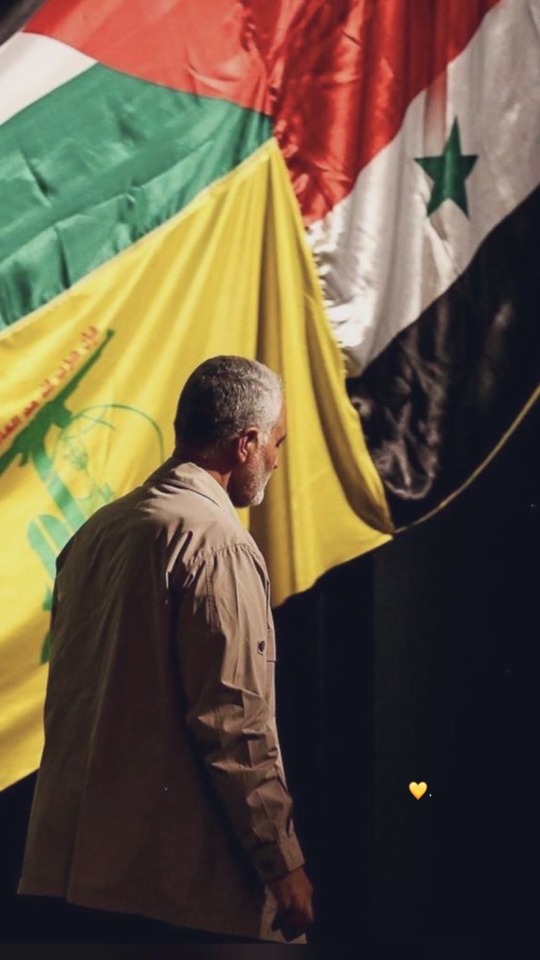
#sardar#qassem soleimani#shia politics#shia#alquds#iran#islam#sardareman#shaheedqassem#Shia#Khamenei
16 notes
·
View notes
Text
The matyr does not die, 'nay, they are alive' (2:154)
Their eyes now open while the living are left asleep
For the loved ones of God, death is but a step
Smiling in their world while leaving us here to weep
- Br. Nouri Sardar
8 notes
·
View notes
Link
One of the many critiques of President Donald Trump’s handling of Iran over the past week is that he made the huge decision to assassinate Iranian general Qassem Soleimani without understanding much—or anything—about Iran’s internal politics or Soleimani’s place in the world. Four years ago, Trump seemed completely unaware of the Quds Force, the elite branch of Iran’s Islamic Revolutionary Guard Corps run by Soleimani. But Trump should have been very familiar with the Revolutionary Guard—because his own business had close ties to it.
In 2012, Trump signed a deal to develop a luxury hotel in Baku, the capital of oil-and-gas-rich Azerbaijan. His business partners on the project presented a range of problems. First off, as Mother Jones detailed in 2015, Azerbaijan is regarded as one of the most corrupt countries in the world, and Trump’s partners were relatives of Ziya Mammadov, the country’s transportation minister and a former Soviet apparatchik with a $12,000 annual salary who had still managed to amass billions in personal wealth.
And then there’s the matter of Iran. According to an excellent 2017 Adam Davidson investigation in the New Yorker, the Mammadov family appears to have had close business ties to construction companies controlled by an associate of the Revolutionary Guard:
In 2008, the year that the tower was announced, Ziya Mammadov, in his role as Transportation Minister, awarded a series of multimillion-dollar contracts to Azarpassillo, an Iranian construction company. Keyumars Darvishi, its chairman, fought in the Iran-Iraq War. After the war, he became the head of Raman, an Iranian construction firm that is controlled by the Revolutionary Guard.
Davidson found that there were more than just passing links between Keyumars Darvishi and the Guard:
At least three Darvishis—the brothers Habil, Kamal, and Keyumars—appear to be associates of the Guard. In Farsi press accounts, Habil, who runs the Tehran Metro Company, is referred to as a sardar, a term for a senior officer in the Revolutionary Guard. A cable sent on March 6, 2009, from the U.S. Embassy in Baku described Kamal as having formerly run “an alleged Revolutionary Guard-controlled business in Iran.” The company, called Nasr, developed and acquired instruments, guidance systems, and specialty metals needed to build ballistic missiles. In 2007, Nasr was sanctioned by the U.S. for its role in Iran’s effort to develop nuclear missiles.
The brothers were awarded at least eight major road projects in Azerbaijan in the years before the Trump hotel tower in Baku was constructed, and a leaked US diplomatic cable from 2009 noted drily, “We assume Mammedov [sic] is a silent partner in these contracts.”
The Trump Baku project was one of a slew of pricey investments that the Mammadov family made around the same time—investments that didn’t quite add up, according to Davidson:
Between 2004 and 2014, Mammadov family businesses spent more than half a billion dollars on large construction projects. They also poured money into a major construction-materials company, an insurance firm, and a new headquarters. It’s not clear how the Mammadovs funded such enormous investments while spending so much on themselves. They may have received loans, or secretly owned profitable businesses that supported the flurry of spending. Another explanation is that some of the investment money came from the Revolutionary Guard, through Azarpassillo.
Davidson’s investigation details a litany of red flags about the Baku project that would have been hard for the Trump family to ignore, including duffel bags stuffed with millions of dollars in cash paid to contractors. But the Trumps claimed never to have noticed anything amiss. A Trump executive told the New Yorker that the company did due diligence on the Mammadovs, but wouldn’t reveal who did the background check or what the results were.
The current Iranian crisis aside, the Foreign Corrupt Practices Act prohibits Americans from being involved with corruption overseas or partnering with people who are involved with corruption, so the Trump Organization certainly had a motive to look into the Mammadovs more closely. Davidson noted that it would have been hard to miss the connection to the Revolutionary Guard.
Under the terms of the contracts signed between the Trump Organization and the Mammadovs, Trump didn’t have to build or own the tower that would bear his name in Baku, but he was paid a licensing fee, and the Trumps were hired to manage a hotel that was set to operate in the building. After he was elected president, Trump pulled out of the deal—which appeared to be dead in the water anyway—but he still earned at least $2.8 million from the early work on the deal. The Trump family claimed to have kept the project at arm’s length, but according to Davidson’s sources, the family, in particular Ivanka Trump, was intimately involved with the most minute details, going far beyond the usual oversight a licensing company might offer:
The Azerbaijani lawyer said, “Ivanka personally approved everything.” A subcontractor noted that Ivanka’s team was particular about wood panelling: it chose an expensive Macassar ebony, from Indonesia, for the ceiling of the lobby. The ballroom doors were to be made of book-matched panels of walnut.
22 notes
·
View notes
Link
Just after midnight local time today, Iranian ballistic missiles "Fateh 313" hit two military bases in Iraq that host a significant concentration of US forces, along with other allies. The Iranian direct hit was the retaliation for the US assassination of the Iranian Revolutionary Guard Corps-Quds brigade Sardar Qassem Soleimani and his companions, killed by a US drone at Baghdad airport last week. The Iranian retaliation carries several strategic messages to the Middle East for this year 2020 and for many years to come. What are these messages? What will come of Iran's open attack on the most powerful country in the world?... Iraq has lost its sovereignty in the middle of the Iran-US battle. It can recover the control of its country only when the US forces leave Iraq as the Iraqi parliament has decided it. The decision came as a response to the assassination of Major General Qassem Soleimani, who was serving as an envoy in a diplomatic capacity. Soleimani was officially invited by the Iraqi government in 2014 when Iraq asked Iran to send 100 Iranian advisors to Iraq to fight ISIS. He had Iraqi immunity and led the Iranian intelligence cell in Baghdad, not far from the US embassy, in coordination with Russian, Syrian and Iraqi officials. He was a diplomat carrying a diplomatic passport and was asked to meet the Prime Minister of Iraq the following day at 08:30 am to receive a message from Saudi Arabia. Prime Minister Abdel Mahdi agreed to play a mediation role between Iran and Saudi Arabia and was the go-between following Iran's peace initiative to the Arab leaders. Soleimani arrived in Iraq following a request from President Trump to calm down the tension with Iran. It was a multi-task trip.... Iran selected to also target the US base in Erbil to send a clear message. According to Iranian officials, it intended for the US to understand that in case its command decides to leave Iraq and gather in Erbil, its presence in Kurdistan is not far from its missiles and that US soldiers won't be safe anywhere in Iraq.... This is the second response to the assassination of Sardar Soleimani. The first came from the Iraqi parliament whose resolution calls for the withdrawal of all foreign forces from the country.... This is far from being the last Iranian hit against US forces in the Middle East. But if President Trump decides to refrain from retaliating, Iran will no longer hit the US forces directly and announce its responsibility.... The time when the US can hit without being hit back seems over. Since Pearl Harbour, this is the first time a country claims its responsibility for hitting US targets. This grave and complicated situation can end if there is a total withdrawal of US forces from Iraq. This step, already officially requested by the Iraqi parliament, can spare US servicemen's lives.
2 notes
·
View notes
Link
0 notes
Text
January 3rd
January 3rd. Today marks a year since Sardar Qassem Soleimani, Iran's top general and second only to the Supreme Leader, was assassinated by an Israeli drone at the United States's command- total dead was 10, all Iraqi or Iranian nationals. Speaking of Israel, their vaccination rollout has been impressive, a tenth of their population already vaccinated, but that does not include Palestinians under military occupation in the West Bank, and despite officials citing the delay on this or that treaty, it'd be naive to excuse measures of genocide. In New York City, vaccinations are only available during regular business hours, complicating and retarding their already flawed tier system- NYC isn't alone, in general, all jurisdictions could be doing a better job curbing mass death by burreacy. A phone call between Trump and Georgia SoS Brad Raffensberger was leaked, not sure who benefits from the ramblings, except the QAnon-ers who will recognize Trump's allegations as originating from their community, which is absorbing any remnants of the alt-right movement at an impressive clip. With no stakes attached, the gesture from Barbara Lee, AOC, and newly-minted Squad member Cori Bush, to abstain on first round votes to renominate Pelosi as Speaker read as vain, and doubly so when during the second round, they voted to confirm her, handing continued power to the most disliked woman in America. Personally, the only highlight regarding the 117th Congress, is the absence of former representative Steve King. Thank God for a relatively boring day, re: news item #1 xxzip
0 notes
Text
دانلود مداحی برای سردار سپهبد حاج قاسم سلیمانی
دانلود نوحه و مداحی برای سردار سپهبد قاسم سلیمانی
Download Madahi Baraye Sardar Haj Ghasem Soleimani
شهادت این شهید بزرگوار را به پیشگاه حضرت ولیعصر (روحی و ارواحنا فداه)، رهبر معظم انقلاب (مد ظله العالی)،
یاران و همرزمانش در سپاه پاسداران انقلاب اسلامی و عموم هموطنان تبریک و تسلیت میگوییم
و از خداوند متعال برای سردار بزرگمان، شهید قاسم سلیمانی،
همنشینی با سرور و سالار شهیدان، حضرت اباعبدالله الحسین(ع)،
و برای خانواده معزز و بازماندگان ایشان، صبر و اجر جزیل مسئلت داریم.
برای دانلود نوحه به ادامه مطلب مراجعه کنید …
دانلود نوحه برای سردار سپهبد حاج قاسم سلیمانی
دانلود آهنگ حامد زمانی سردار من ( دانلود آهنگ )
بگو سردار من وقتی گلوله چارهگر میشه که تو قلب های این مردم امید و عدل جاری شه
http://dl.newsong.ir/music/98/10/Hamed%20Zamani%20Sardare%20Man%20128_(www.newsong.ir).mp3
دانلود مداحی ای کشته ی دور از وطن با صدای محمود کریمی ( دانلود آهنگ )
http://dl.newsong.ir/music/98/10/Nohe%20Haj%20Ghasem%20Soleimani%201_(www.newsong.ir).mp3
دانلود آهنگ علیرضا بیرانوند غرور سپاهی چه سردار ماهی ( دانلود آهنگ )
http://dl.newsong.ir/music/98/10/Nohe%20Haj%20Ghasem%20Soleimani%202_(www.newsong.ir).mp3
دانلود آهنگ بهزاد بختیاری سردار سلیمانی ( دانلود آهنگ )
جهان میدونه که با ظلمت شب سیاهی و تباهیا چه کردیم
بازم دنیا میبینه پاش بیفته سلیمانی ترین مرد نبردیم
http://dl.newsong.ir/music/98/10/Behzad%20Bakhtiyari%20Sardar%20Soleymani%20128_(www.newsong.ir).mp3
نوحه سر میکنم با سیل اشک دیدار ما میدان اشک بی کربلایت جان میدهم ( دانلود آهنگ )
http://dl.newsong.ir/music/98/10/Nohe%20Haj%20Ghasem%20Soleimani%203_(www.newsong.ir).mp3
دانلود مداحی دنیا آمده شده برای یک جنگ جهانی ( دانلود آهنگ )
http://dl.newsong.ir/music/98/10/Nohe%20Haj%20Ghasem%20Soleimani%204_(www.newsong.ir).mp3
دانلود مداحی دست سردار حسین شر اسرائیل را از این جهان کم میکند ( دانلود آهنگ )
http://dl.newsong.ir/music/98/10/Nohe%20Haj%20Ghasem%20Soleimani%205_(www.newsong.ir).mp3
مداحی برای قاسم سلیمانی
Read the full article
0 notes